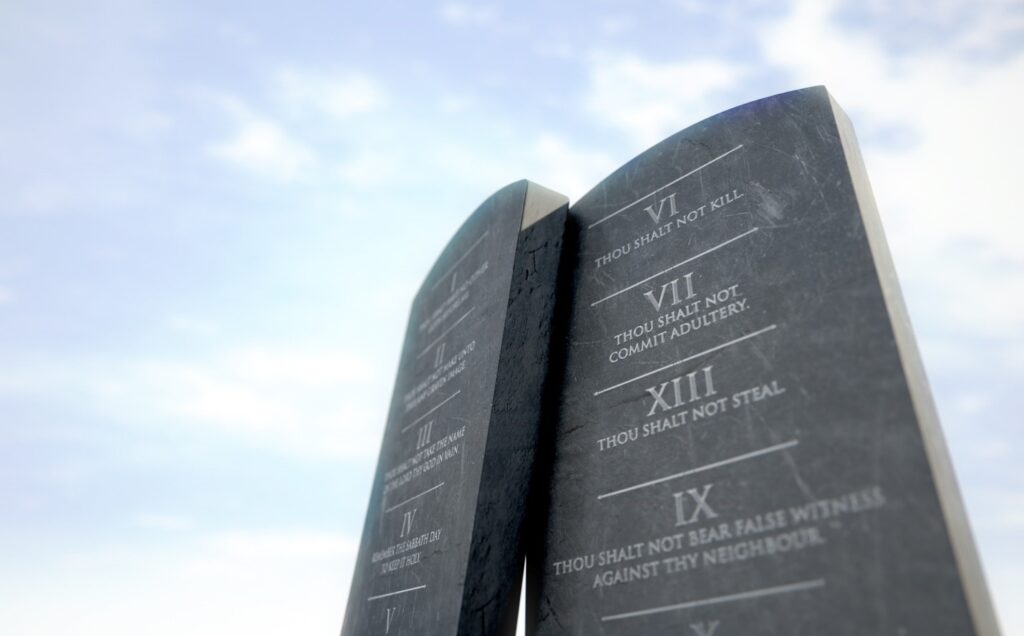
By M.H. Cavanaugh
Christian Action League
January 22, 2021
The Cleveland County School Board is exploring a proposal that would place Ten Commandments displays near each of its schools’ entrances. The matter was first discussed during the School Board’s December 14th Board meeting.
According to the Shelby Star, the issue was not on the agenda as expected this week, but the idea was not dropped but referred to the Board’s Policy Committee. The Board is now under the leadership of a new majority, and they have voted to find a new attorney.
Chairman Robert Queen told the Star, “I expect the attorney selection committee to have a recommendation for the Board on the 25th. Display of the Ten Commandments is still with the Policy Committee that has not had time to meet. There is no deadline for them to report.”
The motion for the proposal, which was made by Board member, Ron Humphries, has drawn the ire of the Freedom From Religion Foundation. The Wisconsin-based legal group holds to a strict view of the separation of church and state and has sent a letter to the Board threatening to sue if the Board passes the initiative. FFRF contends posting the Ten Commandments at schools “would be a flagrant violation of the Establishment Clause” of the U.S. Constitution.
But Humphries argues that the proposal would be consistent with North Carolina law. Rev. Mark Creech, executive director of the Christian Action League, said that Humphries was right.
“I know a good deal about this matter because I remember when the General Assembly passed the law allowing for the posting of the Ten Commandments in the state’s public schools, as long as it was done with other historical documents such as the Magna Carta and the Mayflower Compact,” said Creech.
Creech added that the bill passed in 2001, and its primary sponsor and champion was Sen. Walter Dalton (D), who represented constituents from Rutherford and Cleveland Counties. Dalton later went on to be elected as Lieutenant Governor in 2008, serving from 2009 to 2013. He ran for Governor in 2012, but lost to Pat McCrory.
“Dalton was a spectacular attorney and legislator, and he wrote the bill, HB 195 – NC History Taught/Student Citizen Act of 2001, to meet constitutional muster. By posting the Ten Commandments along with other historical documents related to our state and nation’s founding, it’s not a religious statement, but one about our history. A wide bipartisan majority passed the bill. I remember this quite well because the Christian Action League supported the measure and earnestly lobbied for its passage. I can’t say the FFRF won’t sue, they might, but I do believe it will survive a court challenge. Furthermore, I would hope the Board wouldn’t be bullied by atheist groups like the FFRF, who would rob students of the knowledge from whence our laws were drawn.” said Creech.
Matthew Staver, Chairman of Liberty Counsel, a Christian ministry that engages in litigation related to evangelical values, has written extensively about the Ten Commandments and their displays in public places. Staver has written:
“One would have to rewrite American history to conclude that the Ten Commandments played an insignificant role in the foundation of our system of law and government. William Findley observed that the Ten Commandments were ‘incorporated in the judicial law.’ William Findley, OBSERVATIONS ON ‘THE TWO SONS OF OIL’ 36(1812). John Quincy Adams, the sixth president, stated, ‘The law given on Sinai was a civil and municipal as well as moral and religious code.’ John Quincy Adams, LETTERS OF JOHN QUINCY ADAMS, TO HIS SON, ON THE BIBLE AND ITS TEACHINGS 61 (Auburn: James M. Alden 1850).
“In 1950 the Florida Supreme Court declared:
‘A people unschooled about the sovereignty of God, the Ten Commandments, and the ethics of Jesus could never have evolved the Bill of Rights, the Declaration of Independence, and the Constitution. There is not one solitary fundamental principle of our democratic policy that did not stem directly from the basic moral concepts as embodied in the Decalogue…’
“Florida v. City of Tampa, 48 So.2d 78, 79 (Fla. 1950); see also Commissioners of Johnston County v. Lacy 93 S.E. 482, 487 (N.C. 1917) (‘Our laws are founded upon the Decalogue….’).
“To see the original Constitution and Declaration of Independence, one must first view the Ten Commandments at the entrance to the National Archives. Moses is the only figure facing forward out of twenty-three other profiles of famous lawgivers, and he occupies the central position in the United States House Chamber. Similarly, Moses with the Ten Commandments faces forward in the central position perched over the Chief Justice’s seat in the United States Supreme Court. See Lynch v. Donnelly, 465 U.S. 668,677 (1984).”

Liberty Counsel has argued in legal briefs that when the Ten Commandments appear with historical documents and as a secular display and not a religious one, the display is not a violation of the Constitution’s Establishment Clause.
In a statement provided to the Christian Post, Jeremy Dys, Special Counsel for Litigation and Communications at First Liberty, a legal nonprofit specializing in defense of religious liberty, echoes that sentiment.
“North Carolina law recognizes the Ten Commandments, like the Magna Carta and Mayflower Compact, have much to instruct students about the development of the rule of law in this country,” said Dys.
First Liberty further argues that if the Board rejects the Ten Commandments displays based on their religious content, they could be engaging in “overt hostility toward religion,” which the Supreme Court has ruled “unnecessary and Constitutionally infirm.”
Creech said the Board would need courage if they decide to move forward. They should anticipate pushback. But they should ask themselves, “How can future generations defend our freedoms if they don’t know where those freedoms come from?”
